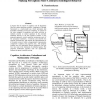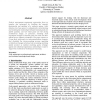1153 search results - page 77 / 231 » An Agent Model for a Human's Functional State and Performanc... |
PAMI
2006
13 years 7 months ago
2006
We describe a learning based method for recovering 3D human body pose from single images and monocular image sequences. Our approach requires neither an explicit body model nor pri...
AAAI
2006
13 years 9 months ago
2006
I propose that the notion of cognitive state be broadened from the current predicate-symbolic, Language-of-Thought framework to a multi-modal one, where perception and kinesthetic...
ISBRA
2007
Springer
14 years 2 months ago
2007
Springer
The fundamental goal of computational neuroscience is to discover anatomical features that reflect the functional organization of the brain. Investigations of the physical connect...
RE
2001
Springer
14 years 10 days ago
2001
Springer
Today's requirements engineering approaches focus on notation and techniques for modeling the intended functionality and qualities of a software system. Little attention has ...
ATAL
2008
Springer
13 years 10 months ago
2008
Springer
The application of reinforcement learning algorithms to Partially Observable Stochastic Games (POSG) is challenging since each agent does not have access to the whole state inform...


